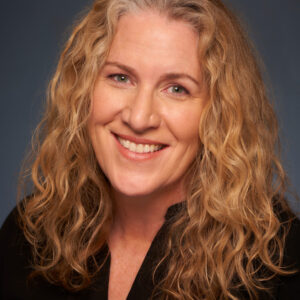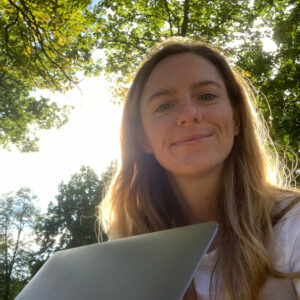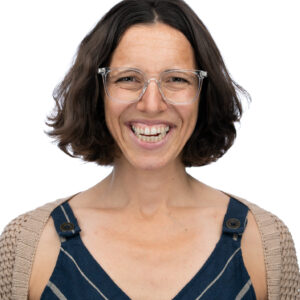Community, community, community.
When three Master of Fine Arts graduands—Amy Cameron, Michaela Cavanagh and Joanna Cheek—were asked what distinguishes King’s Creative Nonfiction program, the answer was the same.
“I’m now a part of an amazing writing community,” says Amy Cameron, who is unabashedly proud of herself for finishing the program. After sending in her last assignment late at night, she recalls cutting across Toronto’s Trinity Bellwoods Park on the way home from her office, elated and sobbing with relief. It was after midnight when she paused en route to text friends in the program and share news of her accomplishment. “Together, we had a quiet celebration,” she says, marvelling.
Michaela Cavanagh, BA(Hons)’12, already had one degree from King’s when she decided to pursue a second. “When I left King’s, I knew I couldn’t have found a better community anywhere else,” says Cavanagh, who divides her time between Ottawa and Berlin. “With the King’s MFA, I tapped into another great community. There are such strong bonds formed, and that’s what gets you through.”
Based in Victoria, B.C., Joanna Cheek was attracted by the low residency aspect of the program. But once underway, she discovered it was the encouragement from mentors and instructors, and the social connections with other students that motivated her. “The program’s strength is its community of support,” she says. “These are people I can email in a second.”
Amy Cameron
 The two years of the King’s MFA were the most exhilarating and arduous that Amy Cameron, 52, a former journalist and mother of two teenagers, has ever experienced. When she started the program in September 2022, the deadlines seemed reasonable despite her high-octane job as a TV producer. After all, work colleagues Sherry White, MFA’23, and Joel Thomas Hynes, MFA’23, who recommended King’s to her, were able to keep on top of coursework at the same time as working on Pretty Hard Cases, a comedic cop show. By then, the show was rolling along in its third season and Cameron felt an urgency to embark on her book, a memoir that is both her own story and her mother’s. Her mother, esteemed journalist Stevie Cameron, suffers from dementia, and has been slipping away over the past 10 years. “I’m racing to write this while she is still with us,” she says. “The book allows me to remember the way she was without it gutting me.”
The two years of the King’s MFA were the most exhilarating and arduous that Amy Cameron, 52, a former journalist and mother of two teenagers, has ever experienced. When she started the program in September 2022, the deadlines seemed reasonable despite her high-octane job as a TV producer. After all, work colleagues Sherry White, MFA’23, and Joel Thomas Hynes, MFA’23, who recommended King’s to her, were able to keep on top of coursework at the same time as working on Pretty Hard Cases, a comedic cop show. By then, the show was rolling along in its third season and Cameron felt an urgency to embark on her book, a memoir that is both her own story and her mother’s. Her mother, esteemed journalist Stevie Cameron, suffers from dementia, and has been slipping away over the past 10 years. “I’m racing to write this while she is still with us,” she says. “The book allows me to remember the way she was without it gutting me.”
But then “manageable” morphed into “incredibly challenging.” On the eve of the in-person residency in June 2023, a TV project Cameron and her sister Tassie Cameron were developing was greenlit, and not just any project but a Canadian addition to the legendary Law & Order franchise. Pre-production for Law & Order Toronto: Criminal Intent began almost immediately, with shooting of all 10 episodes slated to wrap before Christmas.
Those months were intense, with 14-hour production days and scarcely a moment to breathe, let alone write. But somehow she got through with the support of her new community—fellow students, instructors, and mentors, not to mention her husband and kids, who scrawled “You can do it mum!” on the whiteboard in her office. Her book, Before I Go Crazy, is now well underway.
Michaela Cavanagh
 Michaela Cavanagh, 33, also appreciated the flexibility of the program. As an editor at Deutsche Welle (the “German CBC,” says Cavanagh) in Berlin, she was able to keep working full-time while keeping on top of monthly deadlines, attending Zoom meetings despite a five-hour time difference, and travelling to do research.
Michaela Cavanagh, 33, also appreciated the flexibility of the program. As an editor at Deutsche Welle (the “German CBC,” says Cavanagh) in Berlin, she was able to keep working full-time while keeping on top of monthly deadlines, attending Zoom meetings despite a five-hour time difference, and travelling to do research.
Described as a combination of reportage, travelogue and memoir, Cavanagh’s book has the working title of Present Tense: How We Reckon with the End of the World. In it, she tells the stories of how people are responding to the climate crisis, from Indigenous youth in Norway fighting to retain traditional reindeer herding land to workers feeling conflicted about making a good living in the oil industry in Alberta.
Having completed the MFA, she’s now looking forward to finishing her book and polishing her book proposal to send to agents.
Joanna Cheek
 Before enrolling in King’s, Joanna Cheek, 42, a psychiatrist, journalist and mother of two boys, had a book idea that she pitched again and again, only to be rejected again and again. But the MFA program provided her with structure, feedback and clarity, allowing her to make huge strides on her book, called It’s Not You, It’s the World: A Mental Health Survival Guide. All she has to do now is finish it.
Before enrolling in King’s, Joanna Cheek, 42, a psychiatrist, journalist and mother of two boys, had a book idea that she pitched again and again, only to be rejected again and again. But the MFA program provided her with structure, feedback and clarity, allowing her to make huge strides on her book, called It’s Not You, It’s the World: A Mental Health Survival Guide. All she has to do now is finish it.
“And that feels like it will be easy after going through the program,” she says, during a quick Zoom call.
She discovered the program on the recommendation of research scientist Dr. Christian Smith, MFA’17, when she interviewed him as a journalist to discuss his book, The Scientist and the Psychic, published in 2020 by Random House Canada, for a profile in Post Media. “He was so thrilled with the program and that convinced me to sign up.”
Through the program, Cheek was able to rework her idea, refine it and ultimately get an agent. And not only that: she has recently clinched a two-book deal with three major publishing houses in English-speaking countries and one translation rights deal. Details to come.
In the book, Cheek notes that many people are struggling with their mental health these days. Between climate change, global conflicts and the inequities of society weighing us down, our mental health is impacted. Collectively and personally.
What has Cheek learned from examining this issue?
“I feel like our mental health symptoms are like canaries in coal mines. The symptoms signal that the world around us is unhealthy and motivate us to heal it.”

